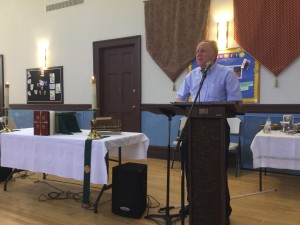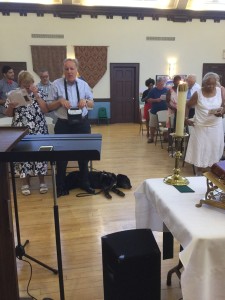[Our guest preacher, Rick Fox, has been blind from birth (the pictures are from today’s service, which was in the Parish Hall, due to the heat). Anyone who has been here at  Christ Church for any length of time, knows Rick, his wife Debbie, and Rick’s guide dog Guy, very well. Rick has served on the vestry for the past three years, and over the last year and a half, has been the Clerk of the Vestry. Rick also serves as a lector, worship assistant, and Sunday School teacher. Rick is very justice focused, particularly in the area of accessibility for all who are physically challenged. His leadership in this area has ensured that we are one of the few churches with a great deal of space that is accessible to all.
Christ Church for any length of time, knows Rick, his wife Debbie, and Rick’s guide dog Guy, very well. Rick has served on the vestry for the past three years, and over the last year and a half, has been the Clerk of the Vestry. Rick also serves as a lector, worship assistant, and Sunday School teacher. Rick is very justice focused, particularly in the area of accessibility for all who are physically challenged. His leadership in this area has ensured that we are one of the few churches with a great deal of space that is accessible to all.
Rick was featured on our website with a video interview by Pat Battle about the program iCanConnect, which provides people who have hearing and vision loss with the ability to connect virtually with anyone using the program. Rick and Debbie are also the hosts of our new and popular Book Club. Above Rick plays the piano at last year’s Fall Founder’s Fest while Guy keeps the tempo.]
 August 14, 2016: May the words of my mouth and the meditation of our hearts be acceptable in your sight, O Lord, our strength and our redeemer. Amen.
August 14, 2016: May the words of my mouth and the meditation of our hearts be acceptable in your sight, O Lord, our strength and our redeemer. Amen.
Those of you who have been parishioners for many years know that this is not my first time preaching, but it is my first time pinch-hitting for Mother Diana. So, I beg of you, be gentle with me.
Isaiah’s prophetic work began in 742 and extended until at least 701 before the Common Era. By this time, the people of Yahweh were living in two separate states, Israel and Judah. They were each about the size of Connecticut, and ripe for the picking by either the large Mesopotamian kingdoms on the northeast or powerful Egypt to the southwest.
In 722, Israel, the Northern Kingdom, was conquered by the Assyrian Empire. The upper classes of the ten tribes who lived in Israel were scattered throughout the empire, and disappeared from history altogether. The people who took their place were resettled from other parts of the Assyrian Empire, and later became the Samaritans. The Samaritans learned to worship the Jewish God, Yahweh, , but were never accepted by the people who lived in Judah, because they were not Hebrews.
In 701, the Assyrian emperor Sennacherib ravaged Judah, the Southern Kingdom, laying siege to Jerusalem. Judah escaped total conquest only by paying a huge indemnity.
The kingdom of Judah was finally obliterated in 586 BCE by the Babylonian king Nebuchadnezzar, who had taken the place of the Assyrians in Mesopotamia. The last Judean king, Zedekiah, was forced to watch his son’s execution, and was blinded and deported.
Isaiah predicted these disasters for his people, and interpreted them as Yahweh’s punishment for the people’s breach of their covenant or contract with God. In Isaiah’s view, the well-off exploited and oppressed the poor. Listen to the voice of the Lord in Isaiah’s first chapter:
“When you stretch out your hands, I will hide my eyes from you;
even though you make many prayers, I will not listen;
your hands are full of blood.
Wash yourselves; make yourselves clean;
remove the evil of your doings from before my eyes;
cease to do evil,
learn to do good;
seek justice, rescue the oppressed,
defend the orphan, plead for the widow.”
Speaking of his vineyard, God demands:
“When I expected it to yield grapes, why did it yield wild grapes?
And now I will tell you what I will do to my vineyard. I will remove its hedge, and it shall be devoured;
I will break down its wall, and it shall be trampled down. I will make it a waste; it shall not be pruned or hoed,
And it shall be overgrown with briers and thorns;
I will also command the clouds that they rain no rain upon it.
For the vineyard of the Lord of hosts is the house of Israel, and the people of Judah are his pleasant planting;
He expected justice, but saw bloodshed;
Righteousness, but heard a cry!”
Now WE are part of the People of that same God, due to the redeeming work of Jesus. Our contract with God can be found in our baptismal vows. In This contract we promise to bear fruit for God’s kingdom.
On page 304 of our Book of Common Prayer, we are asked:
“Will you seek and serve Christ in all persons, loving your neighbor as yourself? Will you strive for justice and peace among all people, and respect the dignity of every human being?”
Our answer is: “I will, with God’s help.”
How Can we heed Isaiah’s warning and work for love and justice in our own lives? God allows us to bear fruit in multiple vineyards. Each of these vineyards requires daily care, through planning, work and prayer.
The first vineyard for most of us is our families. In a family centered around God, all of its members can learn about love, mercy, humility, faith, hope, prayer, and spiritual growth through questioning and doubt. They can learn these things not only by reading and praying, but by living together every day, with God’s help.
During the marriage ceremony, on page 428 in our Book of Common Prayer, the leader says this to prepare the couple for their new vineyard:
“Give them grace, when they hurt each other, to recognize and acknowledge their fault, and to seek each other’s forgiveness and yours. Amen.
Make their life together a sign of Christ’s love to this sinful and broken world, that unity may overcome estrangement, forgiveness heal guilt, and joy conquer despair. Amen.
Bestow on them, if it is your will, the gift and heritage of children, and the grace to bring them up to know you, to love you, and to serve you. Amen.
Give them such fulfillment of their mutual affection that they may reach out in love and concern for others. Amen.”
Let us give thanks for loving families, and pray for greater unity and mercy within them, with God’s help.
A second vineyard is our faith community here at Christ Church. We have been sprucing up our vineyard lately, adding more room to teach and nurture nursery school children, and more and better rooms for our community to grow in faith, serve our neighbors and create a stronger community.
Remember the reminders of our beloved Mtr. Diana and of Rev. Anne Koehler before her. Buildings don’t love God or our neighbors; people do. We, God’s people, are his pleasant plantings, and we are only pleasant so long as we Do justice, love kindness, and walk humbly with our God.
In the Diocese of Newark, there is a Justice Board, which advises our bishop on justice issues. This is what our bishop asks each congregation to do concerning justice:
“Our Bishop, in consultation with the Justice Board, has identified the support and protection of children as the primary focus for justice work in the Diocese of Newark. As the most vulnerable members of our communities, children are greatly affected by inequalities of justice. Given the diversity of socioeconomic backgrounds in northern New Jersey and depending upon individual circumstances, children can experience a wide variety of justice needs – for food and nutrition, for shelter, for education and/or for safety. As part of our common mission to engage the world, the Justice Board asks all congregations to discern the unique justice needs of the children in their communities.”
This Christ Church congregation has consistently donated our time, talent and treasure to organizations helping vulnerable children, such as Apostle’s House, the local food pantry, North Porch, and Crossroads Camp.
We are, with the help of Crossroads, running our second annual Vacation Bible School. Let’s praise God for the opportunity he has given us to love and nurture the children in our care. Let us thank God for these opportunities, and pray that he shows us others.
And then there’s the vineyard of the workplace: We spend most of our daily time and energy there.
Can we seek and serve Christ in our colleagues and supervisors, even in the world of work, which can be competitive and unfeeling? We can, with God’s help.?
In truth, our entire life is a vineyard. God invites us at all times and in all places to seek him through prayer and serve him wherever we are.
This can be hard at times, and we often miss the mark. How do we connect with God’s help in our pilgrimage?
By regularly coming to this community to nourish and share our faith, listening to the Word of God, and partaking in the Holy Eucharist, we are going a long way to continue in the apostles’ teaching and fellowship, in the breaking of the bread, and in the prayers.
Today’s collect speaks of Jesus not only as our savior, but an example of Godly life. It further recommends that we “follow daily in the blessed steps of his most holy life”.
Our Book of Common Prayer has a Daily Office Lectionary, beginning on page 933, where the 4 Gospels are divided into short daily readings. I use an iPhone app called ECP, which displays my daily Gospel reading at the touch of a button. I should use it more regularly than I do.
Though we are hampered by complacency, laziness and pride, Jesus teaches us that with a modicum of faith no bigger than a mustard seed, we can eventually move mountains if we nourish it.
“Therefore,” as our epistle encourages us, “let us also lay aside every weight and the sin that clings so closely, and let us run with perseverance the race that is set before us, looking to Jesus, the pioneer and perfecter of our faith, who for the sake of the joy that was set before him endured the cross, disregarding its shame, and has taken his seat at the right hand of the throne of God.”
We can, with God’s help.
Amen.
For the audio from the 10:30am service, click here:
Isaiah 5:1-7
Psalm 80:1-2, 8-18
Hebrews 11:29-12:2
Luke 12:49-56





